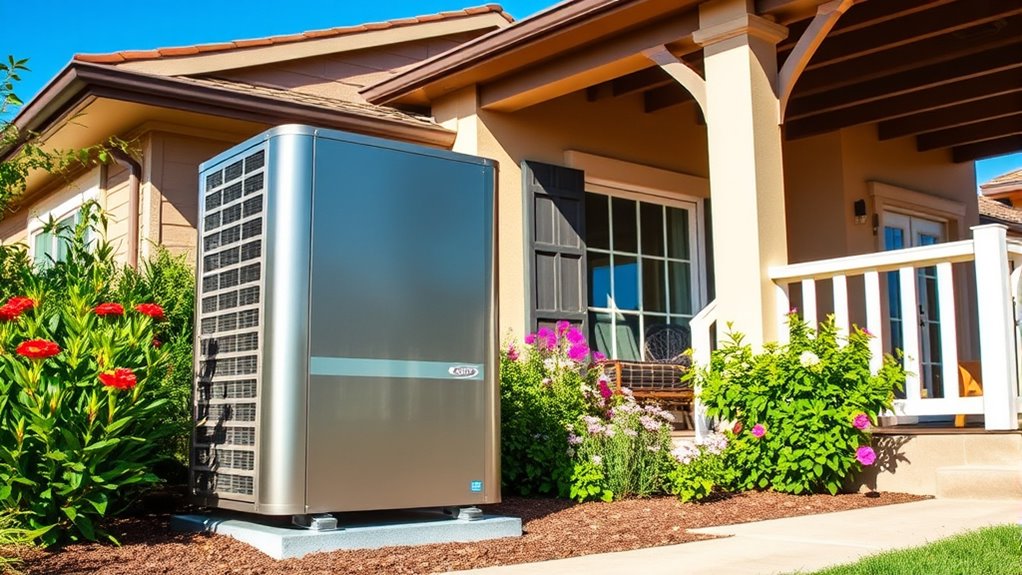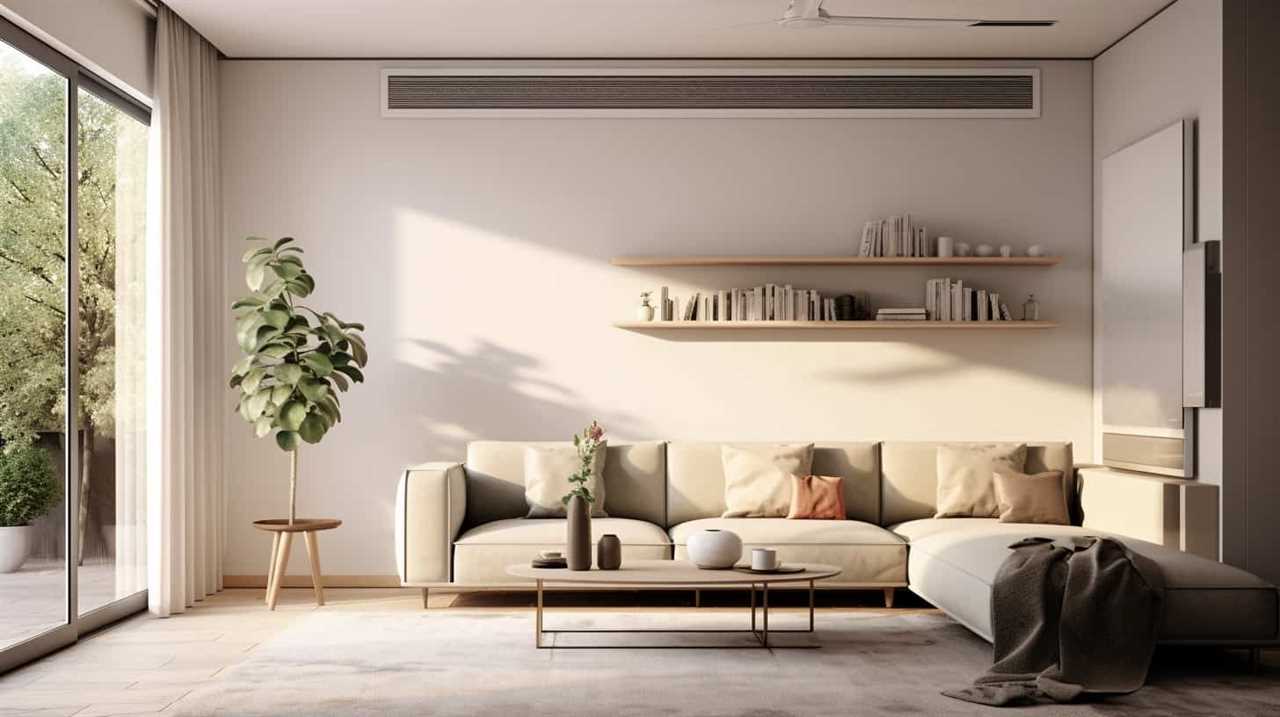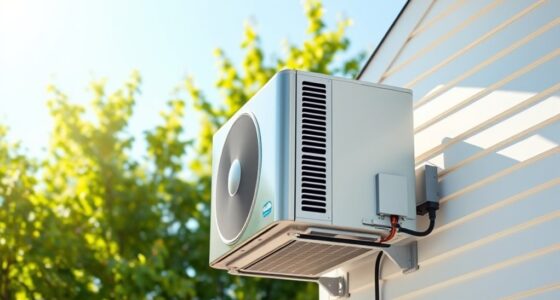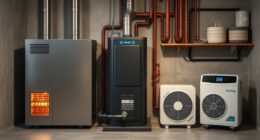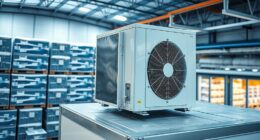Using a heat pump for cooling your home boosts energy efficiency, saving you over 30% on cooling costs by harnessing ambient heat from the environment. It simplifies climate control with one system that cools and heats seamlessly, helping you maintain consistent comfort. Plus, it improves indoor air quality with built-in filters and operates quietly with minimal maintenance. For year-round comfort and smarter control, heat pumps are a smart choice—discover even more benefits as you explore further.
Key Takeaways
- Heat pumps efficiently provide cooling with a COP of up to 5.4, reducing energy consumption and lowering utility bills.
- They combine heating and cooling in one system, offering seamless climate control year-round.
- Heat pumps operate quietly, thanks to noise reduction features and inverter technology.
- They actively filter indoor air, improving air quality by removing pollutants like dust and pollen.
- Their versatility allows effective performance even in extreme weather conditions, ensuring reliable comfort.
Energy Efficiency and Cost Savings
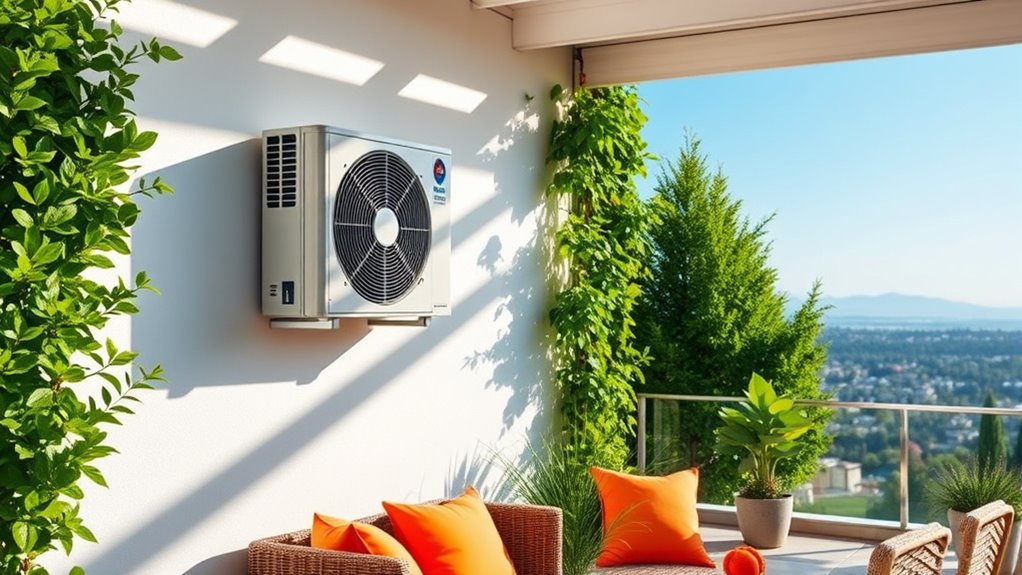
Heat pumps are highly energy-efficient devices that can substantially lower your cooling and heating costs. With a COP of up to 5.4 at 8°C, your heat pump moves five times more heat energy than the electrical energy it consumes, boosting energy efficiency and reducing operating costs. By harnessing around 75-80% renewable energy from the environment, a heat pump helps lower your utility bills and energy bills compared to traditional systems. Installing one can lead to over 30% energy savings annually on cooling costs, especially when combined with other energy-efficient upgrades. Plus, switching seamlessly between heating and cooling in a single system minimizes upfront equipment expenses and maintenance costs, making your home more cost-effective and environmentally friendly in the long run. Additionally, selecting an energy-efficient system can contribute to reducing your carbon footprint and supporting sustainable living. Modern heat pumps also often include advanced smart thermostats that optimize performance and further enhance savings. Incorporating attention in your maintenance routine can ensure your heat pump operates at peak efficiency for longer periods, maximizing your investment.
Simplified Home Climate Control

By combining heating and cooling functions into a single system, heat pumps simplify your home’s climate control. With an air-source heat pump, you get a reliable cooling system that maintains consistent indoor temperature year-round. It reverses refrigerant cycles to switch seamlessly between hot and cold, eliminating the need for separate HVAC units. This integrated approach enhances home comfort by reducing temperature fluctuations and hot or cold spots. You can easily adjust your indoor climate without juggling multiple systems, making temperature regulation straightforward. Plus, since heat pumps optimize energy efficiency, they help lower your overall energy costs while providing effective climate control. Additionally, understanding the sound recording techniques involved can help you optimize the performance of your equipment during installation and maintenance. Proper installation and regular maintenance are crucial for ensuring the efficiency and longevity of your heat pump system. Utilizing system diagnostics can also assist in early detection of potential issues, maintaining optimal operation. Regularly monitoring the digital footprints of your system can help identify unusual activity that might indicate a malfunction. Whether cooling or heating, a heat pump streamlines your home comfort, offering a smarter, more efficient way to manage indoor temperatures effortlessly.
Enhanced Indoor Air Quality

Enhanced indoor air quality is a significant benefit of using heat pumps, as they actively circulate and filter air throughout your home. With effective air filtration, heat pumps reduce airborne pollutants like dust, pollen, and pet dander, improving air quality. To maximize benefits, consider these features:
- High-efficiency filters trap air contaminants, supporting cleaner indoor air.
- Longer run cycles help maintain consistent humidity levels, preventing dry air that can cause irritation.
- Improved ventilation and air circulation reduce indoor emissions from combustion sources, enhancing overall air quality.
- Selecting top-rated filters ensures optimal removal of airborne pollutants and maintains indoor air health. Additionally, models with smart technology can monitor air quality in real time, allowing for more efficient operation and better indoor air management.
- Incorporating air quality sensors into your heat pump system provides continuous feedback, enabling automatic adjustments to improve indoor air conditions. Regular maintenance of filters and sensors further ensures optimal air quality and system performance.
Quiet and Reliable Operation
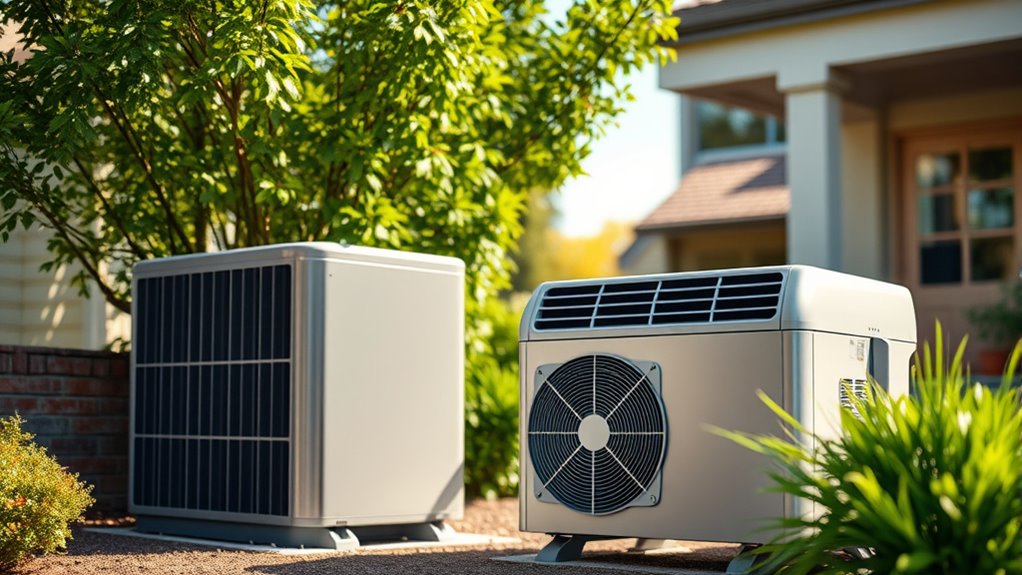
One of the standout advantages of heat pumps is their quiet and dependable operation, making them ideal for maintaining peaceful indoor environments. Thanks to noise reduction features, an air-source heat pump operates with low noise levels, so you won’t be disturbed by loud sounds. The compressor, located outside, minimizes indoor noise and enhances indoor comfort. Modern inverter technology allows the heat pump to adjust its compressor speeds, providing quiet cooling and reducing operational noise further. This results in a device that runs smoothly and reliably, with minimal maintenance needed. You’ll appreciate the consistent performance without disruptive noise, whether in bedrooms, offices, or living areas. Overall, heat pumps offer quiet operation that ensures reliable performance while preserving the tranquility of your home. [Incorporating advanced technology can further optimize the efficiency and noise levels of heat pumps.
Versatility for Year-Round Comfort

Have you ever considered how a single system can keep your home comfortable all year round? Heat pumps offer remarkable versatility for year-round comfort by combining cooling and heating in one unit. With reversible systems, you can:
A single heat pump system provides seamless year-round indoor comfort with energy-efficient cooling and heating.
- Switch seamlessly between cooling and heating modes to maintain ideal indoor temperatures.
- Use the same infrastructure for both functions, reducing space and installation costs.
- Optimize energy efficiency while achieving precise climate control, regardless of outdoor conditions.
- Incorporate heat pump technology into your energy-efficient home by utilizing heat pump technology that adapts to your seasonal needs. Additionally, modern heat pumps can improve indoor air quality, making your home healthier and more comfortable throughout the year.
- The advanced technology used in the best heat pumps ensures they operate effectively even in extreme weather conditions, providing dependable comfort regardless of climate. Moreover, the integration of smart controls allows for more intuitive and efficient operation, enhancing overall comfort and energy savings.
This dual functionality ensures consistent indoor comfort throughout the seasons. By integrating these features into your HVAC system, you benefit from reliable indoor temperatures, lower energy bills, and simplified climate control. Heat pumps are truly a versatile solution for maintaining indoor comfort all year long.
Frequently Asked Questions
How Effective Is a Heat Pump for Cooling?
A heat pump is quite effective for cooling your home, especially with modern inverter technology that adjusts compressor speeds for consistent comfort. You’ll notice even cooling distribution through your chosen emitters, like fan coils or underfloor systems. Ground-source models use renewable energy efficiently, reaching up to 80%, and high SEER ratings of 20+ guarantee strong performance. Overall, heat pumps provide reliable, energy-efficient cooling for your space.
What Is the Downside of a Heat Pump?
You should know that heat pumps have some downsides. When outdoor temperatures go above 35°C, they can lose efficiency and use more energy. In colder climates, you might need backup heating, adding costs and complexity. They can also be noisy, especially during cooling, and extended winter defrost cycles can reduce performance. Plus, the initial cost is higher than traditional air conditioners, which might be a concern for your budget.
Can a Heat Pump Cool a House in 100 Degree Weather?
Yes, a heat pump can cool your house in 100-degree weather, but it depends on the unit’s size and features. Modern models with advanced inverter technology and larger condensers are designed to handle extreme heat effectively. Make sure you select a heat pump rated for high ambient temperatures and verify your home is well-insulated. Proper sizing and installation will help maintain comfort even during very hot days.
Does a Heat Pump Cool Your House?
Imagine a device straight out of a sci-fi flick—yes, your heat pump can cool your house. It reverses its refrigeration cycle to transfer heat outside, effectively lowering indoor temperatures. You’ll notice chilled air or water through fan coils or underfloor piping. Just guarantee your system is designed for cooling, and regular maintenance keeps it running efficiently, giving you reliable, energy-efficient comfort all year round.
Conclusion
Switching to a heat pump for cooling is like giving your home a gust of fresh air—efficient, reliable, and versatile. Not only will you save on energy bills, but you’ll also enjoy quieter, cleaner air year-round. It’s a smart choice that transforms your home into a cozy oasis, no matter the season. Embrace the benefits and let your home’s comfort shine brighter than ever before.
